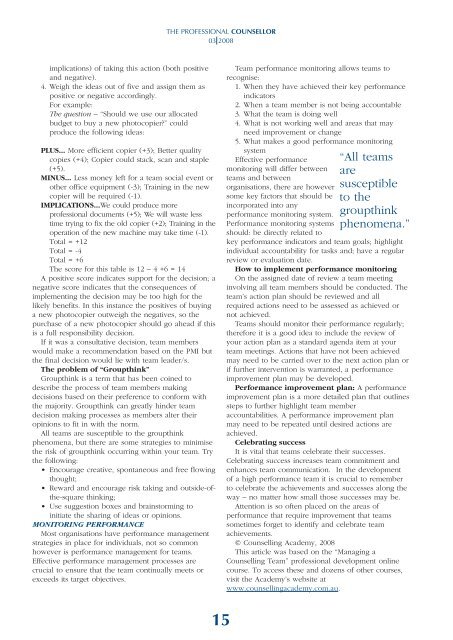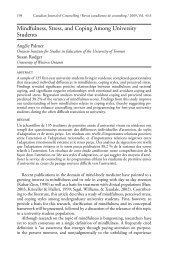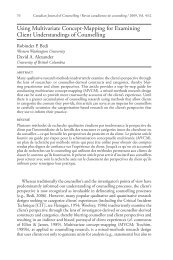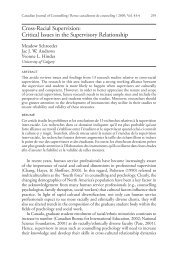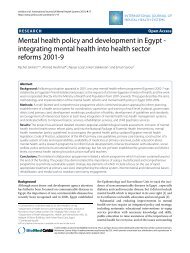PROFESSIONAL COUNSELLOR - Mental Health Academy
PROFESSIONAL COUNSELLOR - Mental Health Academy
PROFESSIONAL COUNSELLOR - Mental Health Academy
You also want an ePaper? Increase the reach of your titles
YUMPU automatically turns print PDFs into web optimized ePapers that Google loves.
THE <strong>PROFESSIONAL</strong> <strong>COUNSELLOR</strong><br />
03 2008<br />
implications) of taking this action (both positive<br />
and negative).<br />
4. Weigh the ideas out of five and assign them as<br />
positive or negative accordingly.<br />
For example:<br />
The question – “Should we use our allocated<br />
budget to buy a new photocopier” could<br />
produce the following ideas:<br />
PLUS... More efficient copier (+3); Better quality<br />
copies (+4); Copier could stack, scan and staple<br />
(+5).<br />
MINUS... Less money left for a team social event or<br />
other office equipment (-3); Training in the new<br />
copier will be required (-1).<br />
IMPLICATIONS...We could produce more<br />
professional documents (+5); We will waste less<br />
time trying to fix the old copier (+2); Training in the<br />
operation of the new machine may take time (-1).<br />
Total = +12<br />
Total = -4<br />
Total = +6<br />
The score for this table is 12 – 4 +6 = 14<br />
A positive score indicates support for the decision; a<br />
negative score indicates that the consequences of<br />
implementing the decision may be too high for the<br />
likely benefits. In this instance the positives of buying<br />
a new photocopier outweigh the negatives, so the<br />
purchase of a new photocopier should go ahead if this<br />
is a full responsibility decision.<br />
If it was a consultative decision, team members<br />
would make a recommendation based on the PMI but<br />
the final decision would lie with team leader/s.<br />
The problem of “Groupthink”<br />
Groupthink is a term that has been coined to<br />
describe the process of team members making<br />
decisions based on their preference to conform with<br />
the majority. Groupthink can greatly hinder team<br />
decision making processes as members alter their<br />
opinions to fit in with the norm.<br />
All teams are susceptible to the groupthink<br />
phenomena, but there are some strategies to minimise<br />
the risk of groupthink occurring within your team. Try<br />
the following:<br />
• Encourage creative, spontaneous and free flowing<br />
thought;<br />
• Reward and encourage risk taking and outside-ofthe-square<br />
thinking;<br />
• Use suggestion boxes and brainstorming to<br />
initiate the sharing of ideas or opinions.<br />
MONITORING PERFORMANCE<br />
Most organisations have performance management<br />
strategies in place for individuals, not so common<br />
however is performance management for teams.<br />
Effective performance management processes are<br />
crucial to ensure that the team continually meets or<br />
exceeds its target objectives.<br />
Team performance monitoring allows teams to<br />
recognise:<br />
1. When they have achieved their key performance<br />
indicators<br />
2. When a team member is not being accountable<br />
3. What the team is doing well<br />
4. What is not working well and areas that may<br />
need improvement or change<br />
5. What makes a good performance monitoring<br />
system<br />
Effective performance<br />
monitoring will differ between<br />
teams and between<br />
organisations, there are however<br />
some key factors that should be<br />
incorporated into any<br />
performance monitoring system.<br />
Performance monitoring systems<br />
should: be directly related to<br />
“All teams<br />
are<br />
susceptible<br />
to the<br />
groupthink<br />
phenomena.”<br />
key performance indicators and team goals; highlight<br />
individual accountability for tasks and; have a regular<br />
review or evaluation date.<br />
How to implement performance monitoring<br />
On the assigned date of review a team meeting<br />
involving all team members should be conducted. The<br />
team’s action plan should be reviewed and all<br />
required actions need to be assessed as achieved or<br />
not achieved.<br />
Teams should monitor their performance regularly;<br />
therefore it is a good idea to include the review of<br />
your action plan as a standard agenda item at your<br />
team meetings. Actions that have not been achieved<br />
may need to be carried over to the next action plan or<br />
if further intervention is warranted, a performance<br />
improvement plan may be developed.<br />
Performance improvement plan: A performance<br />
improvement plan is a more detailed plan that outlines<br />
steps to further highlight team member<br />
accountabilities. A performance improvement plan<br />
may need to be repeated until desired actions are<br />
achieved.<br />
Celebrating success<br />
It is vital that teams celebrate their successes.<br />
Celebrating success increases team commitment and<br />
enhances team communication. In the development<br />
of a high performance team it is crucial to remember<br />
to celebrate the achievements and successes along the<br />
way – no matter how small those successes may be.<br />
Attention is so often placed on the areas of<br />
performance that require improvement that teams<br />
sometimes forget to identify and celebrate team<br />
achievements.<br />
© Counselling <strong>Academy</strong>, 2008<br />
This article was based on the “Managing a<br />
Counselling Team” professional development online<br />
course. To access these and dozens of other courses,<br />
visit the <strong>Academy</strong>’s website at<br />
www.counsellingacademy.com.au.<br />
15


